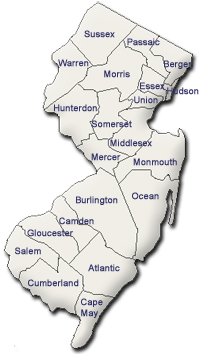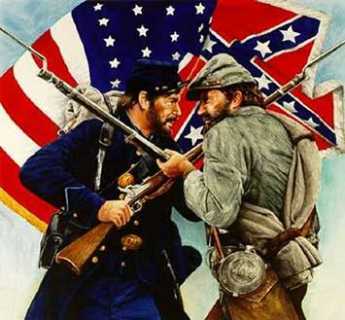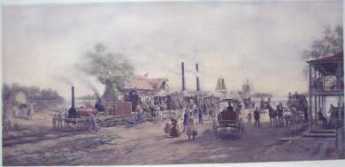Related Topics
Philadelphia Politics
Originally, politics had to do with the Proprietors, then the immigrants, then the King of England, then the establishment of the nation. Philadelphia first perfected the big-city political machine, which centers on bulk payments from utilities to the boss politician rather than small graft payments to individual office holders. More efficient that way.
Philadelphia Legal Scene
The American legal profession grew up in this town, creating institutions and traditions that set the style for everyone else. Boston, New York and Washington have lots of influential lawyers, but Philadelphia shapes the legal profession.
The Proprietorship of West Jersey
The southern half of New Jersey was William Penn's first venture in real estate. It undoubtedly gave him bigger ideas.
Historical Motor Excursion North of Philadelphia
The narrow waist of New Jersey was the upper border of William Penn's vast land holdings, and the outer edge of Quaker influence. In 1776-77, Lord Howe made this strip the main highway of his attempt to subjugate the Colonies.
New Jersey (State of)
 The Garden State really has two different states of mind. The motto is Liberty and Prosperity.
The Garden State really has two different states of mind. The motto is Liberty and Prosperity.
Revolution in New Jersey
Early, brief but significant.
New Jersey: A Keg Tapped at Both Ends (2)
 The New Jersey legislature first fought for Independence, then about debts, then railroads and corporations, and now -- about debt, again. 
|
The New Jersey legislature ratified the Declaration of Independence in the Indian King Tavern of Haddonfield, then moved to Princeton and ever since has been in Trenton. The Statehouse in Trenton is the second oldest in the nation, after the one in Annapolis, although it has grown like a snail with the original building nestled inside many additions. In one sense it is totally unique; it's the only state capitol in the nation where you can look out a window and see another state. It's right on the water's edge of Delaware, a hundred yards from those Hessian barracks that Washington surprised in 1777.

|
| Rivals, North and South |
In its early years the legislature concerned itself with raising troops during the Revolution. After that, it spent a great deal of time settling debts to pay for the Revolution. From that arose the traditional rivalry, even hostility, between the northern and southern halves of the state. To some degree, this reflects the two original provinces of East Jersey (Scottish Quakers) and West Jersey (English Quakers), but the Quaker character persisted much longer in West Jersey. The northern half, with many Dutch settlers spilling over from New York and Congregationalists from Connecticut, evolved into mainly a population of debtors; debtors enjoy inflation because it cheapens the cost of their repayments. The southern half of New Jersey, persistently Quaker in the settlement, was where creditors lived; creditors want to recover the value of the money they risked, so they hate inflation. The Mason Dixon line, extended, would cross southern New Jersey. However, it was the northern half of the state which favored the Confederacy during the Civil War, whereas the Quakers in the south were strongly opposed to slavery. Later on, irritation over permitting Atlantic City gambling was one of the various issues which eventually prompted South Jersey to try to secede from the northern spendthrifts; the secession proposition was actually on the ballot in the late Twentieth Century. Up until 1966 the Republicans always dominated the Senate, but that was because each of the 21 counties had one senator, and you can't gerrymander county lines. Then, it was deviously proposed that the state should be re-divided into 40 numerically equal Senatorial districts (i.e. instead of counties); the Senate has had a Democratic senatorial majority more or less ever since, in spite of numerous Republican majorities in state-wide elections. The legislative districts in the Assembly are reapportioned every ten years to respond to the new census; it is close to the facts that the subsequent gerrymandering of that decennial reapportionment effectively forecloses the politics (and predicts the agenda outcome) within the Assembly for each subsequent decade. In recent years, state Congressional delegations have all become increasingly polarized as a result of partisan gerrymandering. New Jersey leads the way in this unfortunate process: the Assembly and the Congressional delegation are polarized in what has become a national pattern, but in addition, its state Senate is permanently gerrymandered by substituting "districts" for "counties", and redrawing the boundaries in the state constitution.

|
| The Amboy and Camden Railroad |
Over time, the early legislature devoted most of its time to chartering corporations, because there were no universal corporation laws and each new corporation required a separate legislative charter. During the early Industrial Revolution, a great many new businesses sought the authority to limit investor liability. Each corporation had its own enabling act and hence its own deal, its own set of rules and conditions open to limiting amendments by competitors or favorable restatement at the urging of lobbyists. Along came the first railway in America, Stevens's conception of the Amboy and Camden Railroad. The New Jersey legislature, no doubt persuaded by private inducements, not only gave the Amboy and Camden permission to use eminent domain to acquire its right of way, but also conferred a perpetual tax exemption, and perpetual railroad monopoly. For the next fifty years, the legislature then concerned itself with hardly anything except railroad matters. As Willie Sutton said about banks, that was where the money was.
Perpetual is a pretty unambiguous adjective, of course, and it might be an interesting topic in judicial gymnastics to observe how the state would get itself out of the impossible economic straight-jacket of conferring a perpetual monopoly on only one railroad. It proved achievable, however, when the proprietors of a new Stanhope Railroad slipped exemptions and enabling legislation for itself into one of the thousands of corporation bills which flooded through the legislature, unread by anyone except the authors. After the Governor who also hadn't read the bill, signed this sleeper into law, the uproar was predictably loud and accusatory. In a sense, the wrangle about New Jersey railroads was not finally settled by the legislature at all but by the Pennsylvania Railroad, which crossed Delaware at Trenton, and went south to Philadelphia along the Pennsylvania side of the river. New Jersey had not only lost the advantage of railroad competition, but it had also essentially lost all of the main North-South railroad traffic made possible by improved bridge construction methods. Almost all rail traffic was East-West, and the Pennsylvania RR soon captured national dominance. Among other things, railroads thus avoided the expensive hidden costs of going before the New Jersey Legislature. New Jersey preferred to seek a new constitution with a new organization of matters, but one thing about New Jersey never seems to change. Between eleven and twelve thousand bills are still introduced every year. Overloading the attention of the legislators creates the main opportunity for corrupt politics in all legislatures, and is the central strategy for its concealment. It's even worse than New Jersey actually passes about 300 laws a year by sitting for a hundred hours in plenary session: the legislature sits for 30 or 40 three-hour sessions in the afternoon each year, usually Monday and Thursday, from November to May. We try to be a nation of laws and not of men, but it would be hard to praise the application of that truism in New Jersey, where quite obviously the Governor does most of the governing, and deciding, and dispensing. Recent Governors have evidently preferred to borrow money rather than pay any attention to balancing a budget, since New Jersey has gone during fifty years from having no income or sales tax to having the highest of them both, and the highest property taxes, plus $50 billion in debt. Let's repeat the central point: the thing which will matter for a decade is how the legislature gerrymanders the voting districts after the 2010 census. The second source of corruption is the severe limitation of individual political contributions, combined with a lack of limits of donations to the County political machine; the machine totally dominates all New Jersey nominations, and by gerrymandering can ignore the general elections. The public has discovered that this process leads to the second-highest state tax rate in the nation, and wealthy people are fleeing to other states in noticeable numbers. Since wealthy people pay a disproportionate share of taxes, the disappearance of this tax source throws a major tax burden onto those with lower incomes. As this process spirals out of control, something about it must change.
Originally published: Wednesday, September 19, 2007; most-recently modified: Friday, May 24, 2019